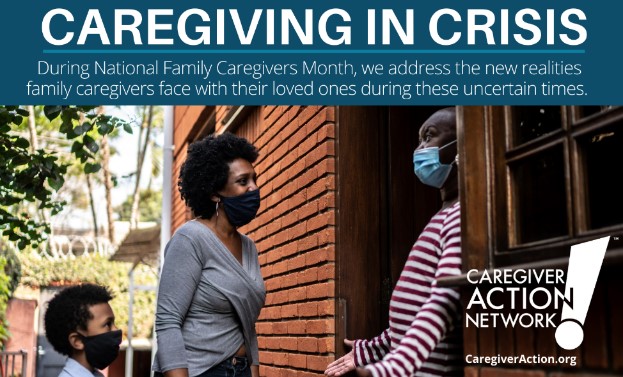Caregiver Grief Comes in Many Forms
Whether your loved one is living in their own home, or a long-term care facility, the pandemic has probably changed how and when you interact with them, and you have probably questioned if visiting – and hugging them – is safe for either of you. If you live in another state, you may not be able to travel to see them as frequently or safely as you did before the pandemic. You may even start to feel like you are no longer their caregiver.
Being a family caregiver means not only taking up new duties, it also means taking on a new identity. This role often takes precedence over other relationships – and during the pandemic, if we can no longer be with the person we are caring for, we are left for a time on a threshold between these roles, not fitting into old patterns and not ready for new activities. No matter how much we do as caregivers, it takes effort to feel we did enough, especially when we are trying to balance our complex roles. When we can no longer be with our care recipient, it can leave us feeling sad and with a sense that we’re not being good caregivers. Many are left with a sense of unfinished business, have feelings that were not expressed, or are denied forgiveness that was not asked.
Caregiver grief is a lonely business. With conditions such as dementia, it usually begins long before your loved one’s death. Depressive feelings of sadness and emptiness, anger, and guilt, are common – and isolating. The challenge lies in looking at our grief as a companion rather than an enemy, a reminder of the preciousness of the relationship. Self-care is critical to managing this grief. When we have no one else to care for but ourselves, it can be difficult to re-establish routines. The discipline of physical exercise, of good nutrition and diet, can begin to take up those spaces that caregiving used to fill, and lay the foundation for what is to come. Caring for oneself with time and patience also helps relieve depression and anxiety, and helps you move beyond loneliness.
Finding new routines during an ever-changing set of restrictions can be especially challenging. If your loved one is living in a long-term care facility, stay in touch with the facility staff. Visitation policies can change at a moment’s notice. And if your loved one lives far away, consider different ways to travel and see them. Renting a small RV and living in it while you visit would be one way of maintaining isolation and avoiding exposure to hotels and airports. And sadly, if your loved one is experiencing a health crisis or is approaching end of life, you may want to re-evaluate your approach. Sometimes, the danger of exposure to COVID can feel less important than saying good-bye in person.
After a time, you will be able to look back and discover many gifts in the caregiving journey you undertook, knowing that you gave so much love and good care under the most trying of circumstances. Eventually, we will all move back into life in a new way, wiser and more patient, with a renewed sense of tenacity and appreciation for the human touch.
Adapted from CAN’s signature series Life After Loss
Caregivers can call Thrive Alliance at 812-372-6918 to get connected to local resources.
Watch this space next Monday for Ten Tips for Family Caregivers. Caregiving is tough. There’s no doubt about it. That’s why this month is dedicated to highlighting the various ways caregivers can meet the challenges of caregiving during the pandemic to help themselves and their loved ones.

